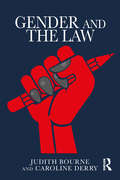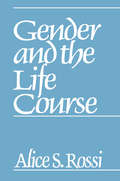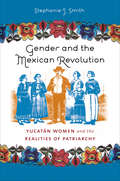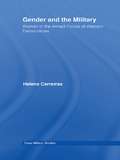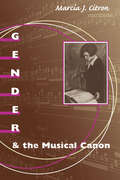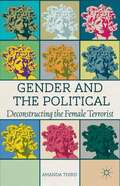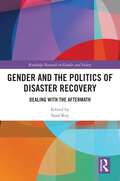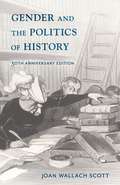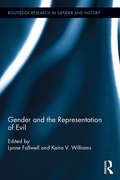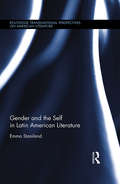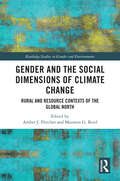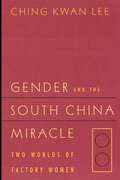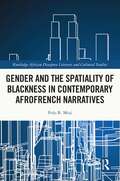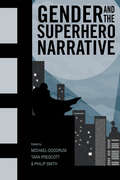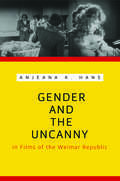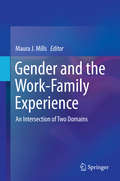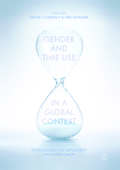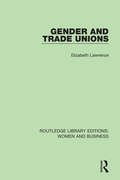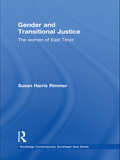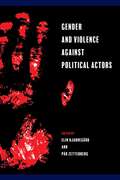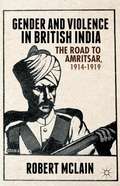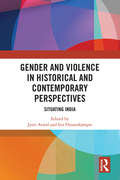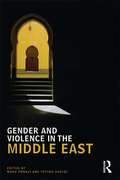- Table View
- List View
Gender and the Law
by Judith Bourne Caroline DerryGender and the Law provides an ideal introduction to gender and feminist theory for students. Beginning with an overview of traditional notions of gender, the book establishes the key feminist and queer legal theories. It provides a basic structure and overview upon which students can build their understanding of some of the complex and controversial topics and debates around gender. Structured thematically, the book explores many fascinating and controversial legal issues, including issues of transgender rights; equal pay and equality in the workplace; societal changes and challenges within the regulation of personal relationships; the law surrounding consent and sexual offences; the role of gender norms in the criminal courts; legal regulation of prostitution and pornography; and the ways in which the law has responded to societal changes surrounding reproduction. With ‘thinking points’ and ‘further reading’ suggestions within each chapter, the authors encourage an engagement with critique and theory in order to understand this dynamic and challenging field.
Gender and the Life Course
by Alice RossiGender and the Life Course is an interdisciplinary collection of essays on the lives of women and men as they are affected by history, culture, demography, economic and political stratification, and the biopsychological processes that attend maturation and aging. The book covers three major topics. Part I, which examines gender and the life course in broad historical perspective, includes a summary of recent work in biological ecology and primatology, and an analysis of the persistence of cultural and gender differences in role organization in societies undergoing the transition from agrarianism to industrialism. Other essays trace the changes in sources of household income of industrial workers over the life span, and review temporal and gender differences in life span transitions.Part II examines gender differentiation in a variety of contexts: psychological, psychobiologi-cal, and sociological. Alice Rossi's ASA Presidential Address reviews recent work on fathering and mothering, and argues that sociological explanations of such gender differences need supplementation by concepts from evolutionary theory and the neurosciences. Three essays deal with gender and economy: one shows how gender stratification took hold in the early stages of industrialization in France, another demonstrates the persistence of gender stratification in modern economies, the third focuses on ideology in relation to gender and political power.Part III examines various aspects of the aged in contemporary society, including an argument for an jnterpretive social science that uses diverse methods to improve our ability to describe and interpret many facets of the lives of elderly men and women; a review of the methodology used to study changes in the aged population over time; and an overview of existing data sets that permit further cohort and longitudinal analyses of the aged. The final essays review social policies as they affect the elderly, with particular attention to the fact that most very old people are women, and the impact of the greatly expanded life course for family and kin relations.Gender and the Life Course is a state-of-the-art assessment of the best work currently being done' on gender and age a's maturational factors and is essential reading for anyone interested in adult development and gender roles.
Gender and the Mexican Revolution: Yucatan Women and the Realities of Patriarchy
by Stephanie J. SmithThe state of Yucat n is commonly considered to have been a hotbed of radical feminism during the Mexican Revolution. Challenging this romanticized view, Stephanie Smith examines the revolutionary reforms designed to break women's ties to tradition and religion, as well as the ways in which women shaped these developments. Smith analyzes the various regulations introduced by Yucat n's two revolution-era governors, Salvador Alvarado and Felipe Carrillo Puerto. Like many revolutionary leaders throughout Mexico, the Yucat n policy makers professed allegiance to women's rights and socialist principles. Yet they, too, passed laws and condoned legal practices that excluded women from equal participation and reinforced their inferior status. Using court cases brought by ordinary women, including those of Mayan descent, Smith demonstrates the importance of women's agency during the Mexican Revolution. But, she says, despite the intervention of women at many levels of Yucatecan society, the rigid definition of women's social roles as strictly that of wives and mothers within the Mexican nation guaranteed that long-term, substantial gains remained out of reach for most women for years to come.
Gender and the Military: Women in the Armed Forces of Western Democracies (Cass Military Studies)
by Helena CarreirasThis is the first comparative, cross-national study of the participation of women in the armed forces of NATO countries. Along side an analysis of this key topic stands a critique of existing theoretical models and the proposal of a revised analytical framework. Unlike previous works this new study employs mixed-methodological research design combining quantitative and qualitative data - a large N-analysis based on general policies and statistical information concerning every country in the sample with more in-depth case-studies. This volume includes original empirical data regarding the presence of women in the armed forces of NATO countries, proposes an index of ‘gender inclusiveness’ and assesses the factors that affect women’s military roles. The book also presents two new key case studies – Portugal and the Netherlands - based on both documentary sources and in-depth interviews of both men and women officers in the two countries. This book will be of great interest to all students and scholars of strategic studies, gender and women studies and military history.
Gender and the Musical Canon
by Marcia J. CitronA classic in gender studies in music Marcia J. Citron's comprehensive, balanced work lays a broad foundation for the study of women composers and their music. Drawing on a diverse body of feminist and interdisciplinary theory, Citron shows how the western art canon is not intellectually pure but the result of a complex mixture of attitudes, practices, and interests that often go unacknowledged and unchallenged. Winner of the Pauline Alderman Prize from the International Alliance of Women in Music, Gender and the Musical Canon explores important elements of canon formation, such as notions of creativity, professionalism, and reception. Citron surveys the institutions of power, from performing organizations and the academy to critics and the publishing and recording industries, that affect what goes into the canon and what is kept out. She also documents the nurturing role played by women, including mothers, in cultivating female composers. In a new introduction, she assesses the book's reception by composers and critics, especially the reactions to her controversial reading of Cécile Chaminade's sonata for piano. A key volume in establishing how the concepts and assumptions that form the western art music canon affect female composers and their music, Gender and the Musical Canon also reveals how these dynamics underpin many of the major issues that affect musicology as a discipline.
Gender and the Political
by Amanda ThirdThe female terrorist circulates within contemporary Western culture as an object of fascination and heightened concern. Gender and the Political analyses cultural constructions of the female terrorist, arguing that she operates as a limit case of both feminine and feminist agency. Drawing on an interdisciplinary theoretical framework, this book demonstrates that the development of the discourse on terrorism evolves in parallel with, and in response to, radical feminism in the US in the late 1960s and early 1970s. Situated at the borderlines between sexuality, threat and abjection, Amanda Third argues that the figure of the female terrorist compels a reexamination of the project of radical politics and the limits of modernity.
Gender and the Politics of Disaster Recovery: Dealing with the Aftermath (Routledge Research in Gender and Society)
by Sajal RoyDrawing a transdisciplinary perspective, this book investigates the ways in which gender intersect with rebuilding and post-disaster recovery process. It shows how climate-induced disasters as well as the recent COVID-19 pandemic have impacted human lives and livelihoods across various global socioeconomic conditions, sociopolitical conditions, and the gendered relationships from the Global South perspective. From the real experiences of the people vulnerable to disasters, this book identifies the strengths and weaknesses of the post-disaster management in different contexts. The varied roles and responsibilities of men and women in different countries are also examined. It is often hard to understand how local and global politics are involved in humanitarian aid. This book also shows how lower-income and under-privileged communities are deprived of their right to access relief and rehabilitation due to political involvement. This text also highlights effective methods of policy implementation for achieving sustainable recovery from these humanitarian crises. It will assist strategy planners and policymakers to focus on gender-based barriers and political hindrances as well as geological and socioeconomic factors in planning inclusive post-disaster activities. The book will be of interest to researchers, postgraduate students and scholars in the fields of Sociology, Social Anthropology, Development Studies, Gender and Cultural Studies, Area Studies, Human Geography, Disaster Management, Forestry and Environmental Science.
Gender and the Politics of History (Gender and Culture Series)
by Joan Wallach ScottThis landmark work from a renowned feminist historian is a foundational demonstration of the uses of gender as a conceptual tool for cultural and historical analysis. Joan Wallach Scott offers a trenchant critique of the compartmentalization of women’s history, arguing that political and social categories are always fundamentally shaped by gender and that questions of gender are essential to considerations of difference in history. Exploring topics ranging from language and class to the politics of work and family, Gender and the Politics of History is a vital contribution to feminist history and historical methodology that also speaks more broadly to the ongoing redefinition of gender in our political and cultural vocabularies.This anniversary edition of a classic text in feminist theory and history shows the evergreen relevance of Scott’s work to the humanities and social sciences. In a new preface, Scott reflects on the book’s legacy and implications for contemporary politics as well as what she has reconsidered as a result of her engagement with psychoanalytic theory. The book also includes a previously unpublished essay, “The Conundrum of Equality,” which takes up the question of affirmative action.
Gender and the Representation of Evil (Routledge Research in Gender and History #25)
by Keira V. Williams Lynne FallwellThis edited collection examines gendered representations of "evil" in history, the arts, and literature. Scholars often explore the relationships between gender, sex, and violence through theories of inequality, violence against women, and female victimization, but what happens when women are the perpetrators of violent or harmful behavior? How do we define "evil"? What makes evil men seem different from evil women? When women commit acts of violence or harmful behavior, how are they represented differently from men? How do perceptions of class, race, and age influence these representations? How have these representations changed over time, and why? What purposes have gendered representations of evil served in culture and history? What is the relationship between gender, punishment of evil behavior, and equality?
Gender and the Self in Latin American Literature (Routledge Transnational Perspectives on American Literature)
by Emma StanilandThis book explores six texts from across Spanish America in which the coming-of-age story ('Bildungsroman') offers a critique of gendered selfhood as experienced in the region’s socio-cultural contexts. Looking at a range of novels from the late twentieth century, Staniland explores thematic concerns in terms of their role in elucidating a literary journey towards agency: that is, towards the articulation of a socially and personally viable female gendered identity, mindful of both the hegemonic discourses that constrain it, and the possibility of their deconstruction and reconfiguration. Myth, exile and the female body are the three central themes for understanding the personal, social and political aims of the Post-Boom women writers whose work is explored in this volume: Isabel Allende, Laura Esquivel, Ángeles Mastretta, Sylvia Molloy, Cristina Peri Rossi and Zoé Valdés. Their adoption, and adaptation, of an originally eighteenth-century and European literary genre is seen here to reshape the global canon as much as it works to reshape our understanding of gendered identities as socially constructed, culturally contingent, and open-ended.
Gender and the Social Dimensions of Climate Change: Rural and Resource Contexts of the Global North (Routledge Studies in Gender and Environments)
by Amber J. Fletcher and Maureen G. ReedDispelling the myth that people in the Global North share similar experiences of climate change, this book reveals how intersecting social dimensions of climate change—people, processes, and institutions—give rise to different experiences of loss, adaptation, and resilience among those living in rural and resource contexts of the Global North. Bringing together leading feminist researchers and practitioners from three countries—Australia, Canada, and Spain—this collection documents gender relations in fossil fuel, mining, and extractive industries, in land-based livelihoods, in approaches for inclusive environmental policy, and in the lived experience of climate hazards. Uniquely, the book brings together the voices, expertise, and experiences of both academic researchers and women whose views have not been prioritized in formal policies—for example, women in agriculture, Indigenous women, immigrant women, and women in male-dominated professions. Their contributions are insightful and compelling, highlighting the significance of gaining diverse perspectives for a fuller understanding of climate change impacts, more equitable processes and strategies for climate change adaptation, and a more welcoming climate future. This book will be vital reading for students and scholars of gender studies, environmental studies, environmental sociology, geography, and sustainability science. It will provide important insights for planners, decision makers, and community advocates to strengthen their understanding of social dimensions of climate change and to develop more inclusive and equitable adaptation policies, plans, and practices.
Gender and the South China Miracle: Two Worlds of Factory Women
by Ching Kwan LeeBoth Yuk-ling, a busy Hong Kong mother of two, and Chi-ying, a young single woman from a remote village in northern China, work in electronics factories owned by the same foreign corporation, manufacturing identical electronic components. After a decade of job growth and increasing foreign investment in Hong Kong and South China, both women are also participating in the spectacular economic transformation that has come to be called the South China miracle. Yet, as Ching Kwan Lee demonstrates in her unique and fascinating study of women workers on either side of the Chinese-Hong Kong border, the working lives and factory cultures of these women are vastly different.In this rich comparative ethnography, Lee describes how two radically different factory cultures have emerged from a period of profound economic change. In Hong Kong, "matron workers" remain in factories for decades. In Guangdong, a seemingly endless number of young "maiden workers" travel to the south from northern provinces, following the promise of higher wages. Whereas the women in Hong Kong participate in a management system characterized by "familial hegemony," the young women in Guangdong find an internal system of power based on regional politics and kin connections, or "localistic despotism."Having worked side-by-side with these women on the floors of both factories, Lee concludes that it is primarily the differences in the gender politics of the two labor markets that determine the culture of each factory. Posing an ambitious challenge to sociological theories that reduce labor politics to pure economics or state power structures, Lee argues that gender plays a crucial role in the cultures and management strategies of factories that rely heavily on women workers.
Gender and the Spatiality of Blackness in Contemporary AfroFrench Narratives (Routledge African Diaspora Literary and Cultural Studies)
by Polo B. MojiThis book approaches the study of AfroEurope through narrative forms produced in contemporary France, a location which richly illustrates race in European spaces. The book adopts a transdiciplinary lens that combines critical black and urban geographies, intersectional feminism, and textual analysis to explore the spatial negotiations of black women in France. It assesses literature, film, and music as narrative forms and engages with the sociocultural and political contexts from which they emerge. Through the figure of the black flâneuse and the analytical framework of "walking as method", the book goes beneath spectacular representations of ghettoised banlieues, televised protests, and shipwrecked migrants to analyse the spatiality of blackness in the everyday. It argues that the material-discursive framing of black flânerie, as both relational and embodied movements, renders visible a politics of place embedded in everyday mico-struggles of raced-sexed subjects. Foregrounding expressive modes and forms that have traditionally received little critical attention outside of the French and francophone world, this book will be relevant to academics, researchers, writers, students, activists, and readers with interests in Literary and Cultural Studies, African and Afrodiasporic Studies, Black Feminisms, Migration Studies, Critical Black Geographies, Francophone Studies, and the comparative framework of Afroeuropean Studies.
Gender and the Superhero Narrative
by Michael Goodrum, Tara Prescott & Philip SmithContributions by Dorian L. Alexander, Janine Coleman, Gabriel Gianola, Mel Gibson, Michael Goodrum, Tim Hanley, Vanessa Hemovich, Christina Knopf, Christopher McGunnigle, Samira Nadkarni, Ryan North, Lisa Perdigao, Tara Prescott-Johnson, Philip Smith, and Maite Ucaregui The explosive popularity of San Diego’s Comic-Con, Star Wars: The Force Awakens and Rogue One, and Netflix’s Jessica Jones and Luke Cage all signal the tidal change in superhero narratives and mainstreaming of what were once considered niche interests. Yet just as these areas have become more openly inclusive to an audience beyond heterosexual white men, there has also been an intense backlash, most famously in 2015’s Gamergate controversy, when the tension between feminist bloggers, misogynistic gamers, and internet journalists came to a head. The place for gender in superhero narratives now represents a sort of battleground, with important changes in the industry at stake. These seismic shifts—both in the creation of superhero media and in their critical and reader reception—need reassessment not only of the role of women in comics, but also of how American society conceives of masculinity. Gender and the Superhero Narrative launches ten essays that explore the point where social justice meets the Justice League. Ranging from comics such as Ms. Marvel, Batwoman: Elegy, and Bitch Planet to video games, Netflix, and cosplay, this volume builds a platform for important voices in comics research, engaging with controversy and community to provide deeper insight and thus inspire change.
Gender and the Uncanny in Films of the Weimar Republic (Contemporary Approaches To Film And Media Ser.)
by Anjeana K. HansThe Weimar period in Germany was a time of radical change, when the traditions and social hierarchies of Imperial Germany crumbled, and a young, deeply conflicted republic emerged. Modernity brought changes that reached deep into the most personal aspects of life, including a loosening of gender roles that opened up new freedoms and opportunities to women. The screen vamps, garçonnes, and New Women in this movie-hungry society came to embody the new image of womanhood: sexually liberated, independent, and--at least to some--deeply threatening. In Gender and the Uncanny in Films of the Weimar Republic, author Anjeana K. Hans examines largely forgotten films of Weimar cinema through the lens of their historical moment, contemporary concerns and critiques, and modern film theory to give a nuanced understanding of their significance and their complex interplay between gender, subjectivity, and cinema. Hans focuses on so-called uncanny films, in which terror lies just under the surface and the emancipated female body becomes the embodiment of a threat repressed. In six chapters she provides a detailed analysis of each film and traces how filmmakers simultaneously celebrate and punish the transgressive women that populate them. Films discussed include The Eyes of the Mummy (Die Augen der Mumie Mâ, Ernst Lubitsch, 1918), Uncanny Tales (Unheimliche Geschichten, Richard Oswald, 1919), Warning Shadows (Schatten: Eine nächtliche Halluzination, Artur Robison, 1923), The Hands of Orlac (Orlacs Hände, Robert Wiene, 1924), A Daughter of Destiny (Alraune, Henrik Galeen,1928), and Daughter of Evil (Alraune, Richard Oswald, 1930). An introduction contextualizes Weimar cinema within its unique and volatile social setting. Hans demonstrates that Weimar Germany's conflicting emotions, hopes, and fears played out in that most modern of media, the cinema. Scholars of film and German history will appreciate the intriguing study of Gender and the Uncanny in Films of the Weimar Republic.
Gender and the Work-Family Experience
by Maura J. MillsConflict between work and family has been a topic of discussion since the beginning of the women's movement, but recent changes in family structures and workforce demographics have made it clear that the issues impact both women and men. While employers and policymakers struggle to navigate this new terrain, critics charge that the research sector, too, has been slow to respond. Gender and the Work-Family Experience puts multiple faces - male as well as female - on complex realities with interdisciplinary and cross-cultural awareness and research-based insight. Besides reviewing the state of gender roles as they affect home and career, this in-depth reference examines and compares how women and men experience work-family conflict and its consequences for relationships at home as well as outcomes on the job. Topics as wide-ranging as gendered occupations, gender and shiftwork, heteronormative assumptions, the myth of the ideal worker, and gendered aspects of work-family guilt reflect significant changes in society and reveal important implications for both research and policy. Also included in the coverage: Gender ideology and work-family plans of the next generation Gender, poverty, and the work-family interface The double jeopardy effect: the importance of gender and race in work-family research When work intrudes upon employees' personal time: does gender matter? Work-family equality: the importance of a level playing field at home Women in STEM: family-related challenges and initiatives Family-friendly organizational policies, practices, and benefits through the gender lens Geared toward work-family and gender researchers as well as students and educators in a variety of fields, Gender and the Work-Family Experience will find interested readers in the fields of industrial and organizational psychology, business management, social psychology, sociology, gender studies, women's studies, and public policy, among others. .
Gender and Time Use in a Global Context
by Rachel Connelly Ebru KongarThis edited volume uses a feminist approach to explore the economic implications of the complex interrelationship between gender and time use. Household composition, sexuality, migration patterns, income levels, and race/ethnicity are all considered as important factors that interact with gender and time use patterns. The book is split in two sections: The macroeconomic portion explores cutting edge issues such as time poverty and its relationship to income poverty, and the macroeconomic effects of recession and austerity; while the microeconomic section studies topics such as differences by age, activity sequencing, and subjective well-being of time spent. The chapters also examine a range of age groups, from the labor of school-age children to elderly caregivers, and analyze time use in Argentina, Australia, Canada, China, Finland, India, Korea, South Africa, Tanzania, Turkey, and the United States. Each chapter provides a substantial introduction to the academic literature of its focus and is written to be revealing to researchers and accessible to students and policymakers.
Gender and Timebound Commandments in Judaism
by Elizabeth Shanks AlexanderThe rule that exempts women from rituals that need to be performed at specific times (so-called timebound, positive commandments) has served for centuries to stabilize Jewish gender. It has provided a rationale for women's centrality at home and their absence from the synagogue. Departing from dominant popular and scholarly views, Elizabeth Shanks Alexander argues that the rule was not conceived to structure women's religious lives, but rather became a tool for social engineering only after it underwent shifts in meaning during its transmission. Alexander narrates the rule's complicated history, establishing the purposes for which it was initially formulated and the shifts in interpretation that led to its being perceived as a key marker of Jewish gender. At the end of her study, Alexander points to women's exemption from particular rituals (Shema, tefillin, and Torah study), which, she argues, are better places to look for insight into rabbinic gender.
Gender and Trade Unions (Routledge Library Editions: Women and Business #2)
by Elizabeth LawrenceThis book, first published in 1994, explores the impact of work and gender roles on union activism, and identifies factors that support and hinder women’s representation in trade unions. These issues are discussed in terms of gender role, work-related and union-related factors. The author details what trade unionists are doing to challenge inequalities that still exist, and identifies factors that divide and unite men and women within trade unions. The author shows the impact that feminism has had on the trade union movement and explores the extent to which men and women have similar priorities for collective bargaining.
Gender and Transitional Justice: The Women of East Timor (Routledge Contemporary Southeast Asia Series)
by Susan Harris RimmerGender and Transitional Justice provides the first comprehensive feminist analysis of the role of international law in formal transitional justice mechanisms. Using East Timor as a case study, it offers reflections on transitional justice administered by a UN transitional administration. Often presented as a UN success story, the author demonstrates that, in spite of women and children’s rights programmes of the UN and other donors, justice for women has deteriorated in post-conflict Timor, and violence has remained a constant in their lives. This book provides a gendered analysis of transitional justice as a discipline. It is also one of the first studies to offer a comprehensive case study of how women engaged in the whole range of transitional mechanisms in a post-conflict state, i.e. domestic trials, internationalised trials and truth commissions. The book reveals the political dynamics in a post-conflict setting around gender and questions of justice, and reframes of the meanings of success and failure of international interventions in the light of them.
Gender and Violence against Political Actors
by Elin Bjarnegård and Pär ZetterbergThere has been an increase in testimonies from women politicians who have been targets of violence and from survivors of conflict-related sexual violence. The editors and contributors to of Gender and Violence against Political Actors seek to understand how gender influences both physical and psychological forms of violence and how sexual violence affects both men and women. Chapters focus on theoretical approaches demonstrating how different disciplinary starting points—e.g., politics, violence and gender—give rise to different lenses. Essays examine violence carried out during conflict and peacetime, and relate to the continuum of violence—physical, sexual, psychological, and online. In addition, six country case studies reveal how different types of political actors have been targets of violence. Gender and Violence against Political Actors ends by providing various approaches to responding to the problem of gendered violence in politics while also evaluating policy responses. Contributors: Kerryn Baker, Julie Ballington, Gabrielle Bardall, Gabriella Borovsky, Cheryl N. Collier, Sofia Collignon, Maria Eriksson Baaz, Eleonora Esposito, Nicole Haley, Rebekah Herrick, Sandra Håkansson, Roudabeh Kishi, Anne-Kathrin Kreft, Mona Lena Krook, Rebecca Kuperberg, Robert U. Nagel, Louise Olsson, Jennifer M. Piscopo, Tracey Raney, Juliana Restrepo Sanín, Paige Schneider, Maria Stern, Sue Thomas, and the editors
Gender and Violence in British India
by Robert MclainIn British India, the years during and following World War I saw imperial unity deteriorate into a bitter dispute over "native" effeminacy and India's postwar fitness for self-rule. This study demonstrates that increasingly ferocious dispute culminated in the actual physical violence of the Amritsar Massacre of 1919.
Gender and Violence in Historical and Contemporary Perspectives: Situating India
by Jyoti Atwal Iris FlessenkämperThis book covers a range of issues and phenomena around gender-related violence in specific cultural and regional conditions. Using an interdisciplinary approach, it discusses historical and contemporary developments that trigger violence while highlighting the social conditions, practices, discourses, and cultural experiences of gender-related violence in India. Beginning with the issues of gender-based violence within the traditional context of Indian history and colonial encounters, it moves on to explore the connections between gender, minorities, marginalisation, sexuality, and violence, especially violence against Dalit women, disabled women, and transgender people. It traces and interprets similarities and differences as well as identifies social causes of potential conflicts. Further, it investigates the forms and mechanisms of political, economic, and institutional violence in the legitimation or de-legitimation of traditional gender roles. The chapters deal with sexual violence, violence within marriage and family, influence of patriarchal forces within factory-based gender violence, and global processes such as demand-driven surrogacy and the politics of literary and cinematic representations of gender-based violence. The book situates relevant debates about India and underlines the global context in the making of the gender bias that leads to violence both in the public and private domains. An important contribution to feminist scholarship, this book will be useful to scholars and researchers of gender studies, women’s studies, history, sociology, and political science.
Gender and Violence in the Middle East (UCLA Center for Middle East Development (CMED) series)
by Moha Ennaji Fatima SadiqiThis book explores the relationship between Islamism, secularism and violence against women in the Middle East and North Africa. Drawing on case studies from across the region, the authors examine the historical, cultural, religious, social, legal and political factors affecting this key issue. Chapters by established scholars from within and outside the region highlight: the interconnections of violence and various sources of power in the Middle East: the state, society, and the family conceptions of violence as family and social practice and dominant discourse the role of violence as pattern for social structuring in the nation state. By centring the chapters around these key areas, the volume provides an innovative theoretical and systematic research model for gender and violence in the Middle East and North Africa. Dealing with issues that are not easily accessible in the West, this book underlines the importance of understanding realities and problems relevant to Muslim and Arab societies and discusses possible ways of promoting reforms in the MENA region. As such it will be of great interest to students and scholars of gender studies, sociology, political science and criminal justice.
Gender And Welfare States In East Asia
by Sirin Sung Gillian PascallContributors address questions about gender equality in a Confucian context across a wide and varied social policy landscape, from Korea and Taiwan, where Confucian culture is deeply embedded, through China, with its transformations from Confucianism to communism and back, to the mixed cultural environments of Hong Kong and Japan.
